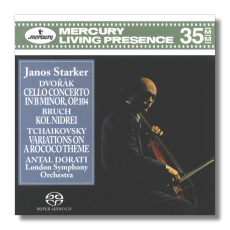
The Internet's Premier Classical Music Source
Related Links
-
Bruch Reviews
Dvořák Reviews
Tchaikovsky Reviews - Latest Reviews
- More Reviews
-
By Composer
-
Collections
DVD & Blu-ray
Books
Concert Reviews
Articles/Interviews
Software
Audio
Search Amazon
Recommended Links
Site News
 SACD Review
SACD Review
Living Presence on SACD

- Antonín Dvořák: Cello Concerto, Op. 104
- Max Bruch: Kol Nidrei
- Piotr Ilyitch Tchaikovsky: Rococo Variations
János Starker, cello
London Symphony Orchestra/Antál Doráti
Mercury Living Presence Hybrid Multichannel SACD 475660-8
Also available on CD 432001-2:
Amazon
- UK
- Germany
- Canada
- France
- Japan
- ArkivMusic
- CD Universe
- JPC
Summary for the Busy Executive: Warm performances of repertory staples.
János Starker burst upon the classical scene, at least in the West, with a series of legendary recordings for EMI of the classics (and even a few rarities) of the cello repertoire. Rostropovich, of course, overtook him, as he overtook every other cellist, but Starker still had his virtues – superb musicianship and a beautiful, though relatively small tone.
I should say up front that my favorite recording of the Dvořák cello concerto remains Fournier and Szell on Deutsche Grammophon. They give you more steel than others and emphasize Dvořák the symphonist. However, Starker and Doráti are certainly in the top rank. They stress a warm, flexible lyricism. Doráti coaxes the best the London Symphony can give. The opening tutti is gorgeous all by itself. Starker's solos, particularly the second-movement cadenza, just about suspends time. Occasionally, however, the interplay between soloist and orchestra is a trifle ragged, and Doráti goads the orchestra into overplaying, especially in the last movement. But these lapses pop up rarely. Furthermore, the sound (I listened to the SACD version, minus the SACD setup) – Mercury's 35mm 3-channel process – is bloody spectacular, even after all these years, without hokey gooses in the bass.
Bruch's Kol Nidrei, often billed as variations on the Yom Kippur prayer, actually varies two melodies: the first, the traditional melody of the Kol Nidrei; the second, a tune that appeared in a collection of settings by English composer Isaac Nathan of Byron's Hebrew Melodies. Most scholars consider Nathan's settings based on traditional Middle European tunes. I've never cared for Bruch's arrangement, in any case, and this performance doesn't change my mind.
We hear the Tchaikovsky in the Wilhelm Fitzenhagen arrangement, now discredited, but at one time the only way cellists performed the work. What Tchaikovsky actually wrote differs significantly, and its first recording dates back only to 1992, with the advocacy of Raphael Wallfisch and Geoffrey Simon (Chandos CHAN8347). Isserlis and Lloyd Webber also play the original. Anything earlier than that is a stunted distortion. Fitzenhagen cut out one variation and rearranged the order of those remaining, which led to further slicing, dicing, and splicing, all by Fitzenhagen rather than by Tchaikovsky. The cellist (also the dedicatee) even inked over Tchaikovsky's original manuscript with his "improvements." Fitzenhagen's version is nice, a bonbon designed to draw applause for the soloist. Tchaikovsky's version, to quote Liszt, is real music. Doráti has always stood among the eminent conductors of Tchaikovsky's ballets (he was the first to record all three), and both he and Starker emphasize the delicacy and clarity of Tchaikovsky's orchestration – a jewel of a performance.
Incidentally, a normal CD player can handle this SACD disc.
Copyright © 2009, Steve Schwartz





















